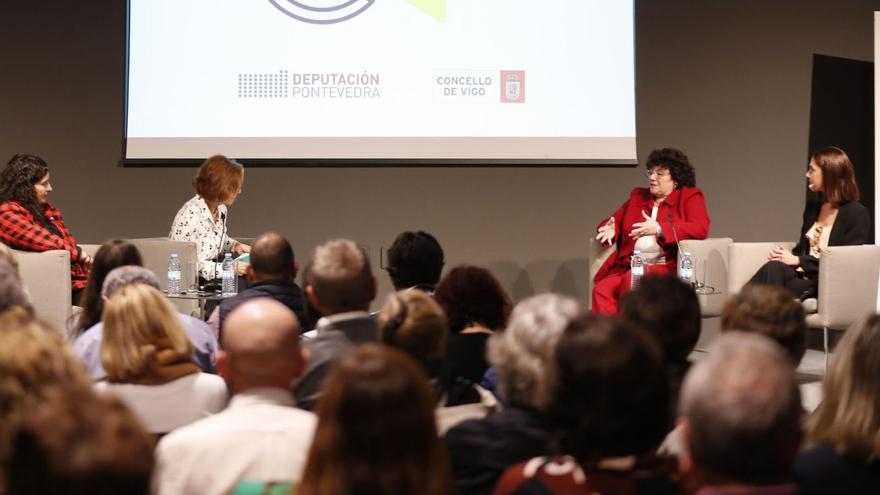“A virus that appears in China takes a plane and is here in a few hours. This is why a pandemic must be seen globally and for this reason the WHO (World Health Organization) should have more supranational power”. This was expressed yesterday by África González, professor of Immunology at the University of Vigo (UVigo), great promoter and reference in this scientific field.
The scientist presented the book “Immune system and vaccines” (University of Vigo) to the FARO Club, which she signs together with the young Mercedes researchers furrier and Andrea Fernández. It is a book that addresses, in a simple and clear way, how it works and what the functions of the immune system are; how the immune response is regulated; what are the main pathogens; what is vaccination; the anti-vaccination movement and which also outlines the lines of research of the IN1 Immunology group at UVigo. The three scientists spoke of all this during the conversation they had at the MARCO in Vigo with Carla Reyes, journalist and president of Executives of Galicia.
Mercedes Peleteiro, head of the CINBIO-Vigo flow cytometry service, explained the history of vaccines and presented the work of this immunology group, focused on the study of the immune response to infectious diseases such as tuberculosis, vaccine design and response , immunotherapy and biocompatibility of nenomaterials. The researcher recalled that vaccines have saved millions of lives; she highlighted its effectiveness not only to protect us from pathogens, but also to treat allergies, some types of cancer and autoimmune diseases; She named smallpox eradication as her biggest milestone and highlighted the role mRNA vaccines play in the COVID pandemic. “They have already proven their effectiveness and will also give a lot to talk about,” said Peleteiro, who also referred to the anti-vaccine movement. “It is paradoxical that there are cases of children in Spain dying of diphtheria, measles or tetanus, totally preventable infections. We had measles basically eradicated and suddenly it came back,” she said.
Andrea Fernández, researcher in the UVigo Immunology group, explained how the immune system works, the most complex, she said, and the only one, together with the nervous system, which has memory, which allows it to recognize a pathogen that has previously infected, a feature that vaccines take advantage of. She also mentioned that smallpox caused more than 500 million deaths before being eradicated by vaccination, which is about to do the same with polio.
As for the book, he commented that his goal is to give a few brushstrokes on the immune system to understand how vaccines really work and to be able to have your own criteria when making a decision. “Sometimes the anti-vaccine movement is due to a lack of knowledge, a misunderstanding or a lack of understanding of how they work,” she said.
González applauded the work of these two researchers and assured that they are a clear example of the new generation of Galician scientists. “From the University of Vigo you can do things, you can work, you can do research. Funding is needed, but with these professionals it can be done,” said the professor.
Regarding the COVID health crisis, the CINBIO-Vigo researcher assured that the world is better prepared than two years ago to face another future pandemic. “I want to at least be optimistic and think we’ve learned something,” he said. However, González does not share this positive view. “We’ve won a vaccine (mRNA) that we can make in weeks as soon as we know the sequence of the pathogen, but we haven’t learned anything,” he said.
The professor explained that one of the problems with vaccines being developed in Spain was precisely the lack of resources. “We have some very good researchers, but Spain is not an agile country to suddenly put a billion into developing a vaccine,” said the immunologist, who took the opportunity to advise parents to vaccinate their children aged between 6 years against the flu. months and 5 years because their immune system is still immature, because of the simultaneous circulation of several viruses and because they have hardly been exposed to any in the last two years.
A very complex surveillance system
In the prologue to “Immune system and vaccines”, its authors explain that the book aims to bring the reader closer to the cellular and humoral components of the immune system, a complex internal surveillance control system whose function goes far beyond the defense against pathogens, as it carries out a continuous internal control. Its function is to detect and eliminate dead, senescent and tumor cells; participates in wound healing, detects internal danger signals and distinguishes between self and foreign components. This is why it participates in the elimination of tissues and organs (refuses incompatible transplants) and carries out an iron defense against potential microbes that enter our bodies.
“Knowing how the immune response works against viruses, bacteria and other pathogens is what will enable the development of preventive measures against various infectious diseases through the use of vaccines,” they explain. Vaccination allows to activate the immune response against harmless components of microbes and to generate immune memory against them. In this way our body will be prepared for the arrival of the pathogen.

